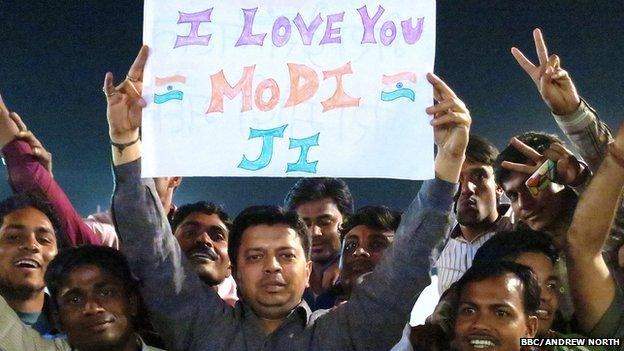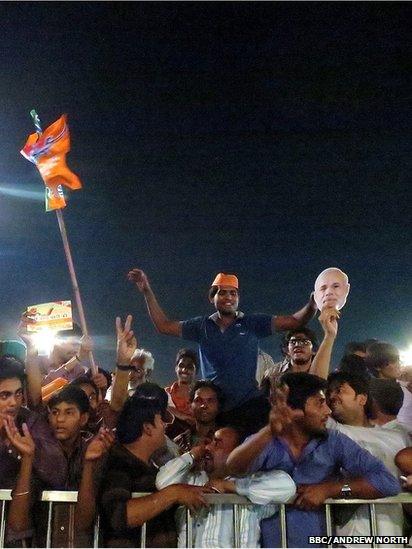'Modi mania' at Delhi rally
- Published

The man who may be India's next prime minister didn't live up to his reputation for punctuality, showing up more than an hour late for his first major rally in Delhi.
But the crowd wasn't bothered at all. "Modi mania" had already taken hold, expertly managed by his party workers in a now practised routine.
Warm-up speakers had been keeping the mood bubbling over a powerful tannoy system, with the most eager supporters in the audience taking it in turns to lead chants of "Modi-ji" (Modi-Sir).
Many people had been brought in hours earlier to ensure a good turnout, the fleet of buses parked outside ready to take them home.
His party workers had handed out hundreds of paper face-masks, so Narendra Modi's determined and slightly unnerving middle distance stare was already there.
As night came, stadium-style lights lit up a sea of cheering faces - most of them men - draped in the green and saffron colours of the BJP.
Cameras on cranes swooped overhead and with several large LED screens placed around the venue, it looked more like a rock concert than a political rally.

It was the big attraction of the night in this poor rundown Delhi suburb, with scores of children pushing to join the crowd.
There was an impressive security presence. Delhi police had armed officers posted on every half-built rooftop overlooking the venue as well as searching everybody coming in.
A bullet-proof speaking screen placed on stage for Mr Modi added to the atmosphere of what many Indian commentators are already calling the most presidential-style election yet.
No detail had been been forgotten in the choreography. In the front row of the audience, next to the camera stand in the media enclosure, sat a group of bearded men wearing skull-caps.
Here was the BJP's answer to its opponents who say that Mr Modi is still at heart a Hindu fundamentalist who will stoke communal tensions.
We didn't need to ask the Muslims to talk to us. A BJP party worker standing nearby was already calling them over. "People say all sorts of things but I believe what I see for myself," said one of them, Zaki Anwar, who makes bangles for a living.
"Modi is a hard working person, so he will work to reduce poverty and I am putting my hope in him."
But the questions over Mr Modi's role in the 2002 anti-Muslim riots in his home state of Gujarat still linger. So a significant shift of Muslim support his way still looks unlikely.
But in the secrecy of the voting booth, who can say.
At a time when many Indians feel their country has lost its way, Mr Modi's promise of a return to high-speed growth and strong leadership has growing appeal.
When the man himself finally appeared, the crowd erupted. Dispensing with the bullet-proof screen, he spoke for just 25 minutes.
But it hardly mattered to this crowd, or what he said.
"We love you Modi," they shouted again and again.